Lasswell Harold D. The Political Writings of Harold D. Lasswell
Подождите немного. Документ загружается.

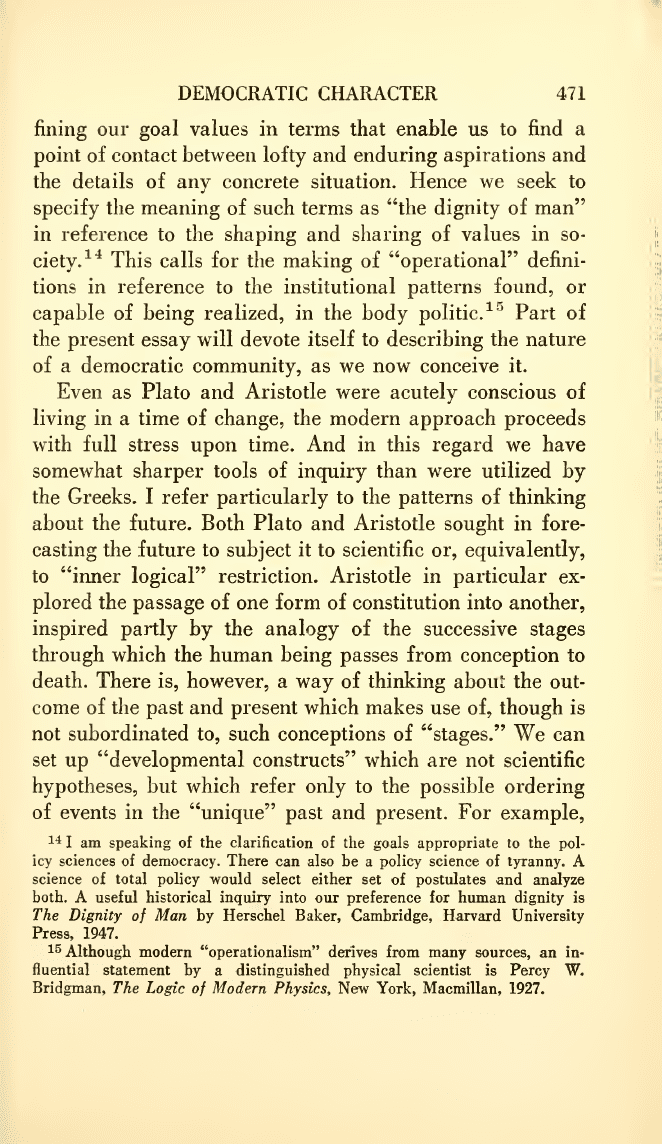
DEMOCRATIC CHARACTER
471
fining our
goal
values
in
terms
that enable us
to find a
point
of
contact between lofty
and
enduring
aspirations
and
the details of any
concrete
situation.
Hence
we
seek to
specify the meaning
of such terms as "the
dignity of man"
in reference
to the shaping and sharing of
values in
so-
ciety.^"* This calls for the making of
"operational" defini-
tions in reference to the institutional
patterns found,
or
capable
of
being realized, in the
body
politic.
^^
Part
of
the present
essay
will devote itself to describing the nature
of a democratic community,
as
we now conceive it.
Even
as Plato and
Aristotle were acutely conscious
of
living in
a
time
of
change, the modern approach proceeds
with full stress
upon
time.
And
in this regard
we
have
somewhat sharper tools of inquiry than were utilized
by
the Greeks. I refer particularly
to the
patterns
of
thinking
about the future. Both Plato
and
Aristotle
sought in fore-
casting
the
future to
subject it to
scientific
or, equivalently,
to "inner
logical"
restriction. Aristotle
in
particular
ex-
plored
the passage of one form of constitution into another,
inspired
partly by the analogy of the successive
stages
through
which the human being passes from conception
to
death. There
is,
however,
a way of thinking aboul: the
out-
come of the past and present which
makes use of, though
is
not subordinated
to, such
conceptions
of "stages."
We can
set
up
"developmental constructs" which
are not scientific
hypotheses,
but
which refer only
to
the possible
ordering
of events in the "unique"
past
and
present.
For
example,
i"*
I
am speaking
of
the clarification
of the goals appropriate to the
pol-
icy
sciences
of democracy. There
can also be
a
policy science
of tyranny.
A
science
of
total policy
would select either set
of
postulates
and analyze
both.
A useful
historical inquiry
into our preference for human dignity
is
The Dignity
of
Man by Herschel Baker, Cambridge,
Harvard University
Press, 1947.
15
Although modern "operationalism"
derives from
many
sources,
an in-
fluential
statement
by
a
distinguished physical scientist
is
Percy
W.
Bridgman,
The Logic
of
Modern Physics,
New York, Macmillan,
1927.
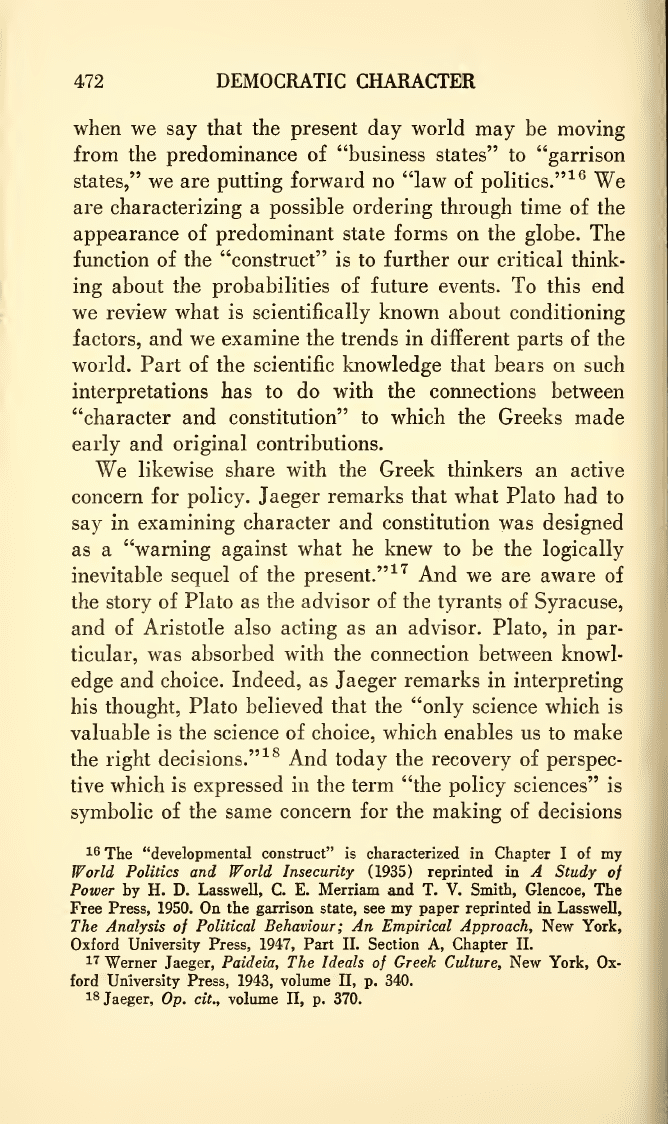
472 DEMOCRATIC CHARACTER
when we say that the present day world
may be moving
from the predominance of
"business
states"
to "garrison
states,"
we
are putting
forward no "law
of
politics."
^^
We
are characterizing a
possible ordering
through time
of the
appearance of predominant state forms
on
the
globe. The
function of the "construct" is to further our critical
think-
ing about
the probabilities of future events. To this
end
we
review what is scientifically known about conditioning
factors,
and
we
examine the trends in
different
parts
of the
world. Part
of the
scientific knowledge that bears
on such
interpretations has to do
with
the
connections
between
"character and
constitution" to which the Greeks
made
early and
original contributions.
We
likewise share with the Greek thinkers
an active
concern for
policy.
Jaeger
remarks that what
Plato had to
say
in examining
character and constitution
was designed
as a
"warning
against what he knew
to be the logically
inevitable sequel
of the present."
^^
And
we are aware of
the
story of
Plato
as
the advisor of the tyrants
of Syracuse,
and
of
Aristotle
also
acting as an advisor.
Plato, in par-
ticular, was
absorbed with the connection
between knowl-
edge
and choice.
Indeed, as
Jaeger
remarks
in
interpreting
his thought,
Plato believed that the "only science
which is
valuable is
the science of choice, which enables
us to make
the right
decisions."
"^^
And
today the recovery of perspec-
tive
which is expressed
in
the
term
"the policy sciences"
is
symbolic
of the same
concern for the making
of decisions
16
The "developmental
construct" is characterized in Chapter
I
of
my
World
Politics and World
Insecurity
(1935)
reprinted in A Study
of
Power by H. D.
Lasswell,
C.
E.
Merriam
and T. V.
Smith,
Glencoe,
The
Free Press, 1950. On
the garrison state, see my paper reprinted in
Lasswell,
The Analysis
of
Political Behaviour; An Empirical Approach,
New York,
Oxford
University Press,
1947,
Part XL Section A,
Chapter
II.
1^
Werner Jaeger,
Paideia, The
Ideals
of
Greek Culture, New
York, Ox-
ford University
Press, 1943,
volume
11, p.
340.
18
Jaeger, Op.
cit.,
volume
11,
p.
370.
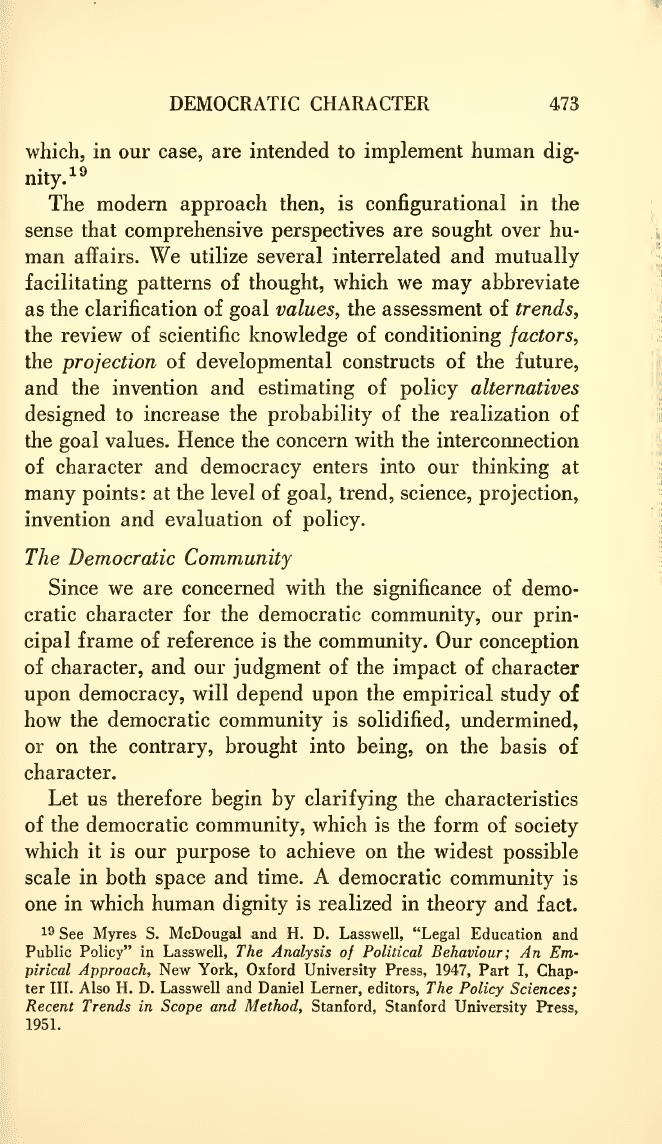
DEMOCRATIC CHARACTER 473
which, in our case, are
intended
to
implement human
dig-
nity.
^^
The modem approach then, is
configurational in
the
sense that comprehensive perspectives
are sought over
hu-
man
affairs.
We
utilize several interrelated and mutually
facilitating patterns of
thought, which
we
may abbreviate
as the clarification of goal values, the
assessment of trends,
the review of scientific
knowledge
of
conditioning
factors,
the projection of
developmental constructs
of the future,
and
the invention and
estimating of
policy alternatives
designed to increase the
probability
of the
realization
of
the goal
values. Hence the
concern with
the interconnection
of
character and democracy
enters into
our thinking
at
many points: at the level of goal, trend, science,
projection,
invention and
evaluation of policy.
The Democratic
Community
Since we are
concerned with the
significance
of demo-
cratic character for the democratic community,
our prin-
cipal frame
of
reference is the community.
Our conception
of character, and our judgment of the impact
of
character
upon
democracy, will depend upon
the empirical
study
of
how
the democratic community
is solidified,
undermined,
or
on
the contrary, brought into
being,
on the basis
of
character.
Let us
therefore begin
by
clarifying
the characteristics
of the democratic community, which
is the form
of society
which it is our purpose to achieve on
the widest
possible
scale in both space
and time. A
democratic
community
is
one
in which
human dignity
is realized in theory
and fact.
19
See
Myres
S.
McDougal
and H. D. Lasswell, "Legal
Education
and
Public Policy" in Lasswell,
The
Analysis
of
Political
Behaviour
; An
Em,'
pirical Approach, New York, Oxford
University Press,
1947, Part
I,
Chap-
ter
in.
Also H. D. Lasswell and
Daniel
Lerner, editors.
The Policy
Sciences;
Recent Trends
in Scope and
Method,
Stanford, Stanford
University
Press,
1951.
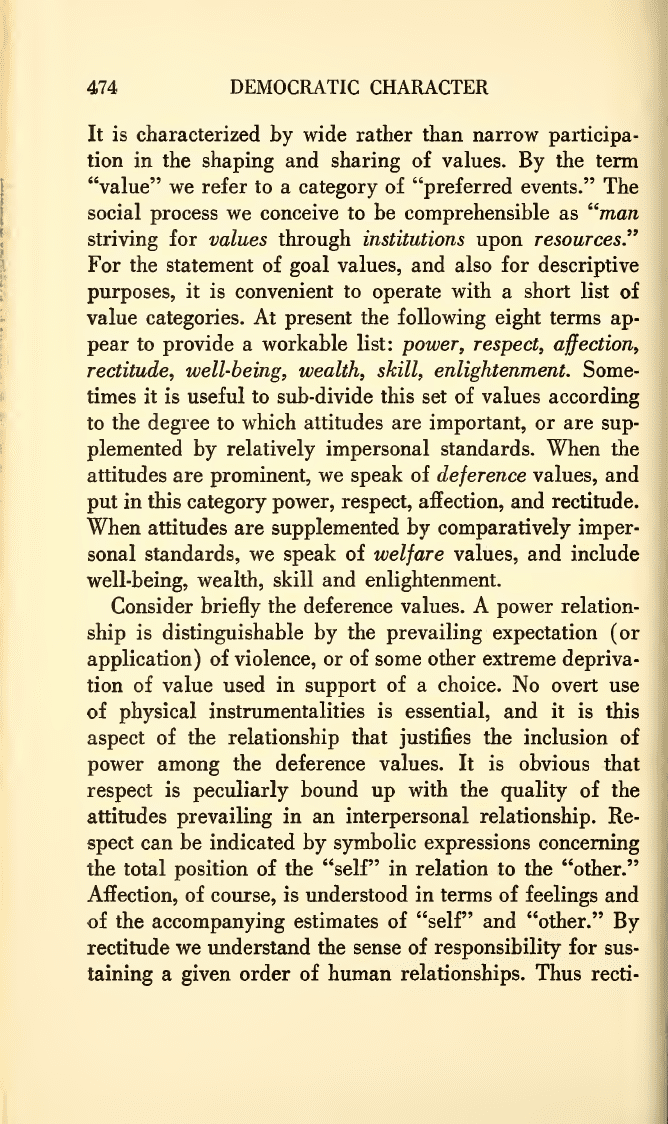
474
DEMOCRATIC CHARACTER
It is characterized
by wide
rather than narrow
participa-
tion in the shaping and sharing of values. By the term
"value" we refer to
a
category of "preferred events."
The
social process we conceive to be comprehensible
as
"man
striving for values through
institutions
upon resources/'
For
the statement
of goal
values, and also for descriptive
purposes, it is convenient to operate with
a
short list
of
value
categories. At present the following eight terms
ap-
pear to
provide
a
workable list: power, respect,
affection,
rectitude,
well-being, wealth, skill, enlightenment. Some-
times it
is
useful to sub-divide this set of values according
to
the degree
to
which attitudes are
important,
or are sup-
plemented
by
relatively
impersonal
standards. When the
attitudes are prominent, we
speak of
deference
values, and
put
in
this category power,
respect, affection,
and rectitude.
When attitudes are supplemented by
comparatively imper-
sonal standards, we
speak of
welfare
values, and
include
well-being, wealth,
skill and enlightenment.
Consider
briefly the deference values. A power relation-
ship is
distinguishable by the prevailing expectation
(or
application)
of
violence, or of some
other extreme
depriva-
tion
of value
used
in support of a choice. No
overt
use
of
physical instrumentalities is essential, and it is this
aspect of the relationship that
justifies
the inclusion
of
power among the deference
values.
It is obvious
that
respect is peculiarly
bound
up
with the
quality
of
the
attitudes prevailing in an
interpersonal relationship.
Re-
spect can be indicated by
symbolic expressions
concerning
the total position of the
"self" in relation
to the "other."
Affection, of course,
is understood in terms of
feelings and
of the
accompanying estimates of "self" and "other."
By
rectitude we
understand the sense of
responsibility
for
sus-
taining
a given
order of human
relationships.
Thus
recti-
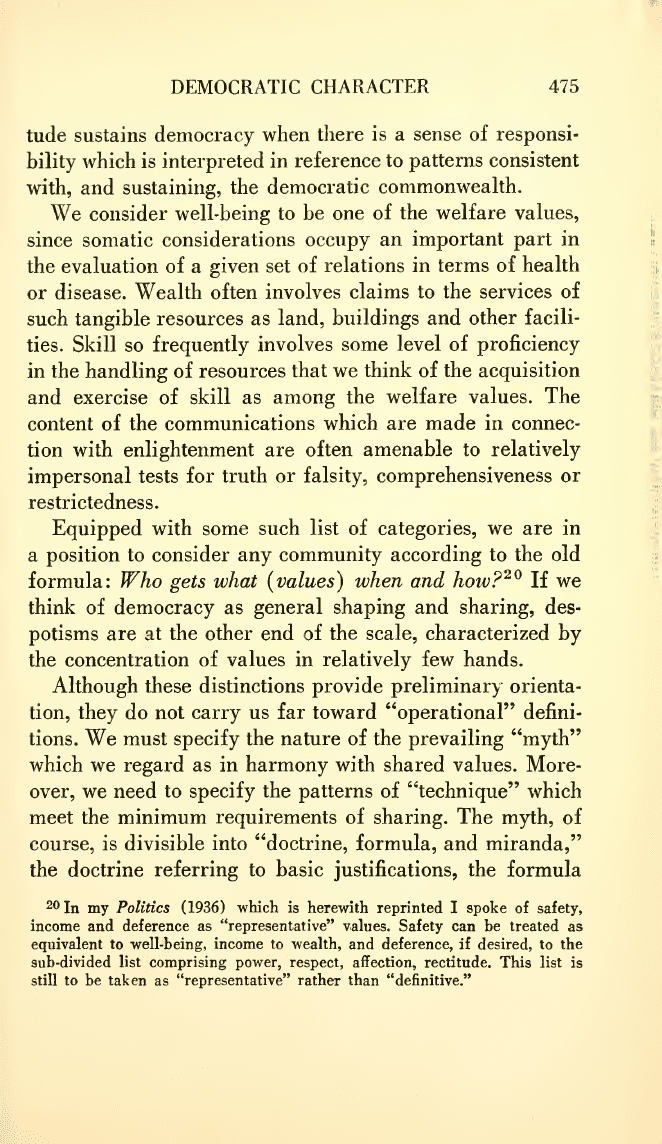
DEMOCRATIC
CHARACTER 475
tude sustains
democracy when
there
is a sense of responsi-
bility which is
interpreted in
reference
to patterns consistent
with, and
sustaining, the
democratic
commonwealth.
We consider
well-being to
be one
of the welfare values,
since somatic
considerations
occupy
an
important part in
the evaluation
of
a
given set
of
relations in
terms of health
or disease.
Wealth often
involves
claims to the services of
such
tangible resources as
land,
buildings and other
facili-
ties. Skill
so
frequently
involves
some level of proficiency
in the handling of
resources
that we think of the
acquisition
and exercise of
skill
as
among the welfare values. The
content of the
communications
which are made in connec-
tion with
enlightenment are
often amenable
to
relatively
impersonal tests
for truth
or falsity, comprehensiveness
or
restrictedness.
Equipped with some such list
of categories,
we
are in
a position
to consider any
community according
to
the old
formula:
Who
gets
what (values)
when and how?^^
If
we
think
of
democracy
as
general shaping
and
sharing,
des-
potisms are at the other end of
the scale, characterized
by
the
concentration of
values
in
relatively few
hands.
Although these distinctions provide
preliminary
orienta-
tion, they
do
not carry us
far toward
"operational" defini-
tions. We must specify the
nature
of
the prevailing
"myth"
which we regard as
in harmony with shared values.
More-
over, we need
to specify the patterns
of
"technique"
which
meet
the
minimum
requirements
of sharing. The
myth, of
course, is
divisible into "doctrine, formula,
and miranda,"
the doctrine
referring to basic justifications, the
formula
20
In my
Politics
(1936)
which
is herewith reprinted
I spoke of safety,
income
and
deference as
"representative"
values. Safety
can be
treated
as
equivalent to well-being, income
to
wealth, and deference, if
desired, to the
sub-divided list comprising power, respect, affection,
rectitude.
This
list
is
still to be taken as "representative" rather than "definitive."
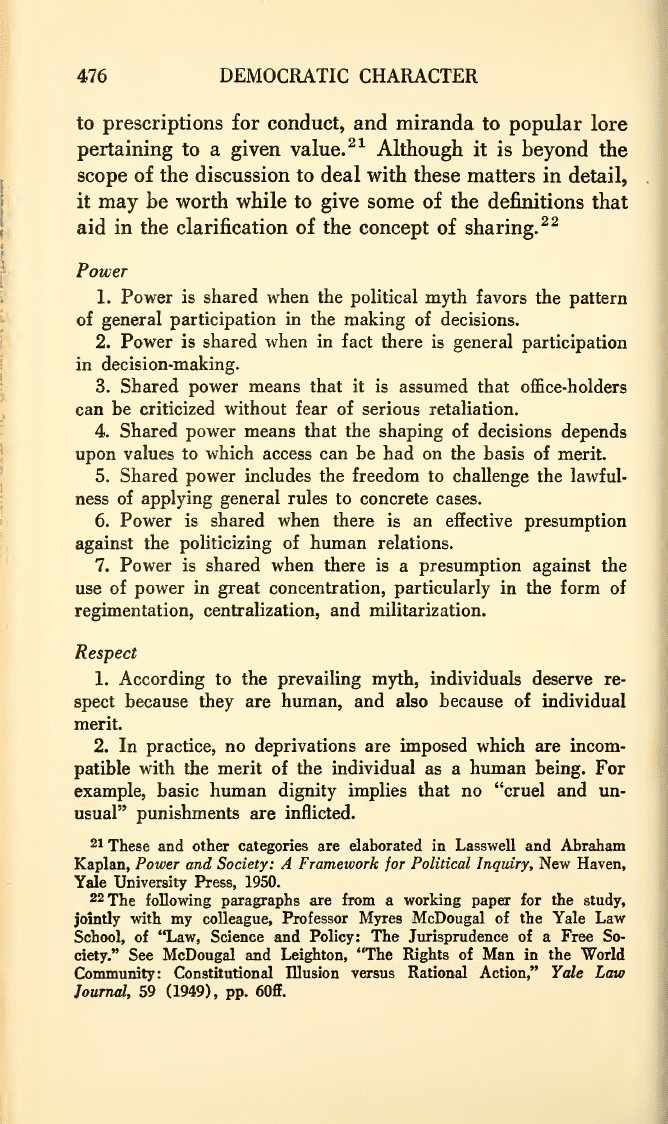
476
DEMOCRATIC
CHARACTER
to prescriptions for conduct, and miranda
to
popular
lore
pertaining
to a
given
value.
^^
Although
it is beyond
the
scope
of the discussion to deal with these
matters
in detail,
it may be worth
while
to
give
some of the
definitions
that
aid
in
the
clarification of the concept
of sharing.
^^
Power
1.
Power is
shared when the
pohtical myth
favors
the pattern
of
general
participation in the
making of decisions.
2.
Power is
shared when in fact
there is general
participation
in
decision-making.
3. Shared
power means that it is
assumed that office-holders
can be
criticized without fear of serious retaliation.
4. Shared
power means that the shaping
of decisions
depends
upon
values to which access can
be had
on
the basis of
merit.
5.
Shared power includes
the freedom
to challenge
the lawful-
ness
of
applying general rules
to concrete
cases.
6.
Power is shared
when
there
is
an effective
presumption
against the
politicizing of human relations.
7.
Power
is
shared when there is
a
presumption
against the
use
of
power
in
great concentration, particularly
in the form of
regimentation, centralization, and militarization.
Respect
1.
According to the
prevailing myth, individuals
deserve
re-
spect
because they are
human, and
also because
of
individual
merit.
2. In
practice, no
deprivations
are imposed which are incom-
patible
with the merit
of
the individual
as a
himian being.
For
example,
basic human
dignity
implies that no "cruel and
un-
usual"
punishments
are
inHicted.
21
These and
other categories are
elaborated
in
Lasswell
and Abraham
Kaplan,
Power
and
Society: A Framework
for
Political Inquiry,
New Haven,
Yale
University Press, 1950.
22
The
following
paragraphs are from
a
working
paper for
the
study,
jointly
with
my
colleague. Professor Myres
McDougal of the Yale Law
School, of
"Law, Science and
Policy: The Jurisprudence
of a
Free So-
ciety." See
McDougal and
Leighton, "The
Rights
of Man in
the
World
Community:
Constitutional Illusion versus
Rational Action," Yale Law
Journal, 59
(1949),
pp.
60ff.
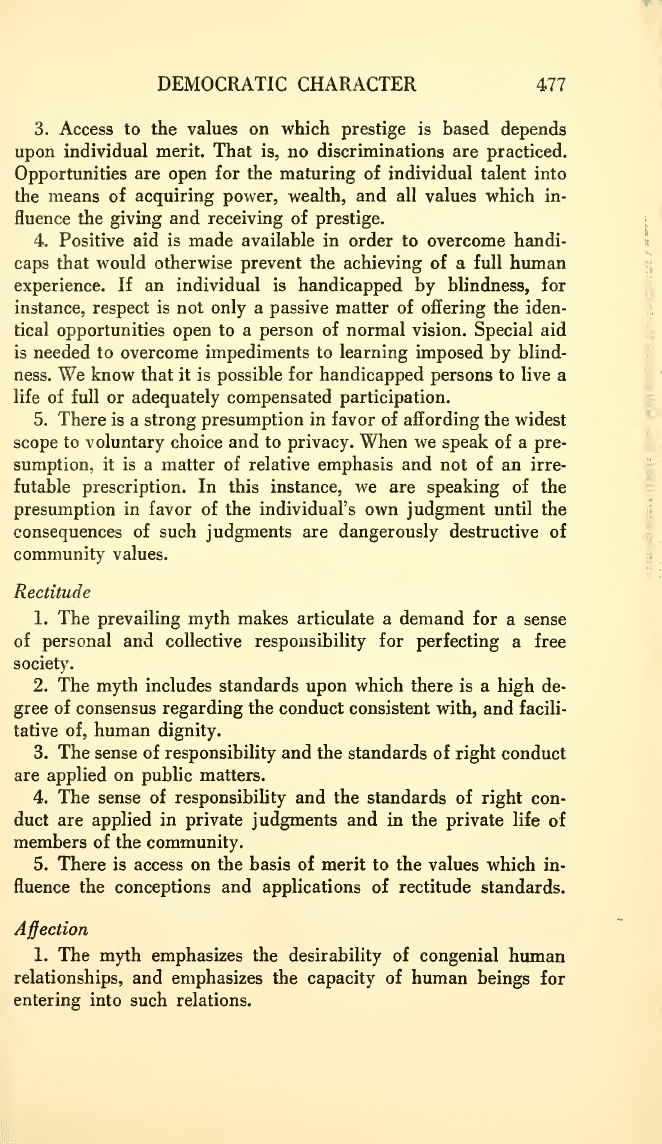
DEMOCRATIC CHARACTER
477
3. Access to the
values on which prestige
is
based
depends
upon individual merit. That is,
no
discriminations are
practiced.
Opportunities
are open for the maturing of individual talent into
the means of
acquiring power,
wealth,
and all values
which in-
fluence
the
giving and receiving of prestige.
4. Positive aid is made available in order
to overcome
handi-
caps that
would otherwise prevent the achieving of
a full human
experience.
If an individual
is
handicapped
by blindness, for
instance, respect
is not only
a
passive matter
of offering the iden-
tical
opportunities open to a person of
normal
vision. Special aid
is needed to overcome
impediments
to
learning
imposed
by
blind-
ness.
We
know that it is possible for handicapped
persons to
live
a
life of full
or
adequately compensated participation.
5. There is
a
strong
presumption in favor of affording
the widest
scope
to
voluntary
choice
and
to privacy. When we speak
of a
pre-
sumption, it is a matter of relative emphasis and not of
an irre-
futable prescription. In this instance, we are speaking of
the
presumption in favor of the individual's own judgment until
the
consequences
of
such
judgments
are dangerously destructive
of
community values.
Rectitude
1. The prevailing myth makes articulate
a demand for
a
sense
of personal and collective responsibility for
perfecting
a
free
society.
2. The myth includes standards upon which there
is a high de-
gree
of
consensus regarding the conduct consistent
with,
and facili-
tative
of, human dignity.
3.
The sense of responsibility and the
standards of right
conduct
are applied on public matters.
4.
The sense of responsibility
and the standards of right
con-
duct
are
applied in private judgments
and in the private life
of
members of
the
community.
5. There is access
on the
basis of merit to the values
which in-
fluence the conceptions and applications of rectitude
standards.
Affection
1. The myth emphasizes
the
desirability of
congenial
human
relationships,
and
emphasizes
the
capacity of
human
beings
for
entering
into
such
relations.
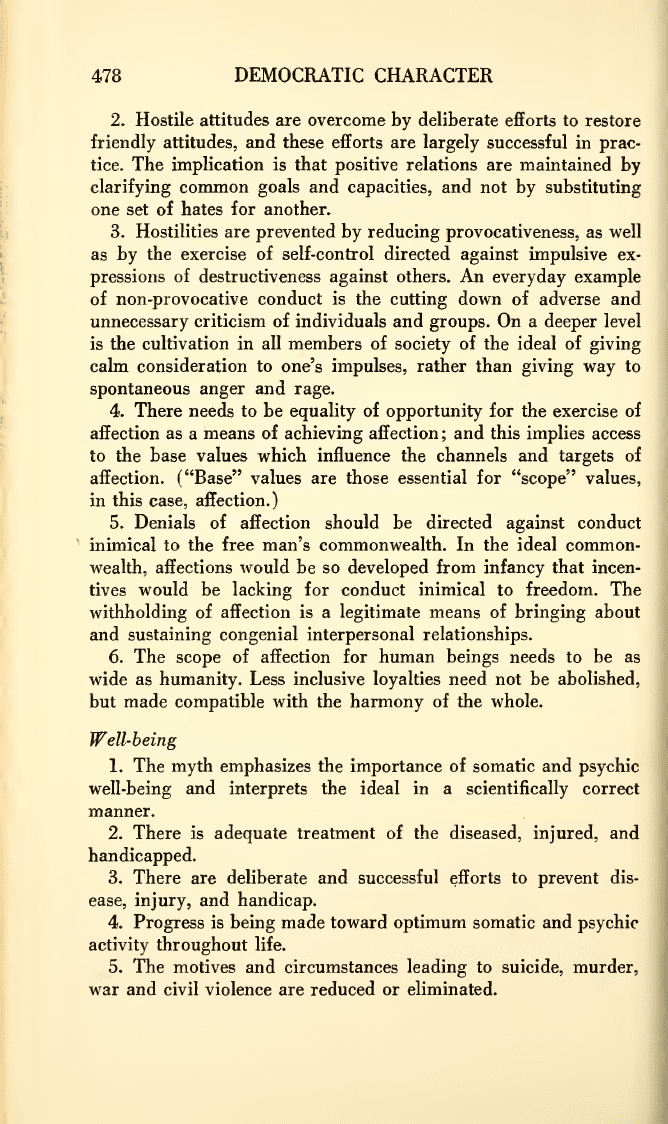
478
DEMOCRATIC
CHARACTER
2. Hostile
attitudes are overcome
by deliberate efforts to
restore
friendly attitudes, and
these
efforts are largely
successful in
prac-
tice. The
implication
is
that positive relations
are maintained
by
clarifying common goals and capacities, and
not by substituting
one set of hates
for another.
3.
Hostilities are prevented
by reducing provocativeness,
as
well
as
by the exercise
of self-control
directed against impulsive
ex-
pressions
of
destructiveness against others. An everyday
example
of non-provocative conduct is the cutting down
of adverse and
unnecessary criticism of individuals
and groups. On a deeper level
is the cultivation in
all members
of society
of
the ideal
of
giving
calm consideration to one's impulses, rather than giving way to
spontaneous anger and rage.
4. There needs to be
equality of opportunity for
the exercise
of
affection as
a
means of
achieving affection
;
and this implies
access
to the base values which
influence
the channels and targets
of
affection. ("Base" values are those essential for "scope" values,
in this case,
affection.)
5.
Denials of
affection
should be directed against conduct
inimical
to the free man's commonwealth. In the ideal common-
wealth,
affections would
be so developed
from infancy that incen-
tives
would be lacking for conduct
inimical
to freedom. The
withholding of
affection
is a
legitimate means of bringing
about
and sustaining
congenial
interpersonal
relationships.
6.
The
scope
of affection for human beings needs to be as
wide
as humanity. Less inclusive
loyalties
need not be
abolished,
but
made compatible with the harmony of the whole.
Well-being
1. The
myth emphasizes
the
importance of somatic and psychic
well-being and interprets the
ideal in
a
scientifically
correct
manner.
2. There is adequate
treatment
of
the
diseased, injured, and
handicapped.
3. There
are
deliberate
and
successful efforts to prevent
dis-
ease, injury, and handicap.
4. Progress
is
being made toward
optimum
somatic and psychic
activity
throughout life.
5. The motives and circumstances
leading to suicide,
murder,
war and civil violence are reduced or
eliminated.
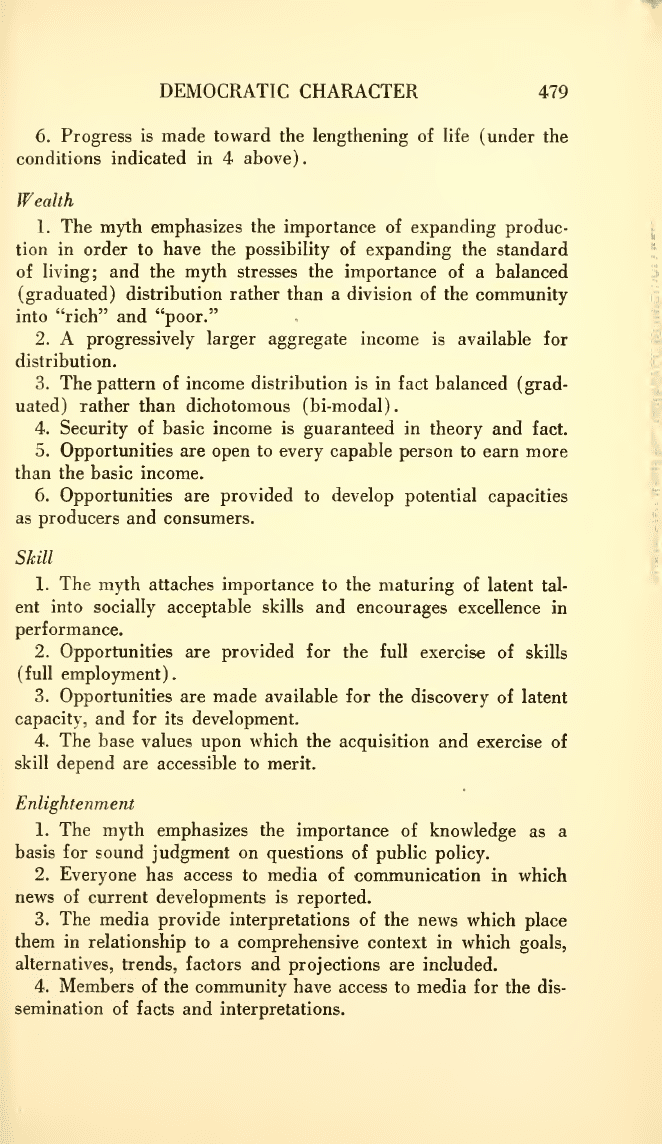
DEMOCRATIC
CHARACTER
479
6.
Progress
is made toward the lengthening
of life
(under
the
conditions
indicated
in 4
above)
.
Wealth
1. The myth emphasizes the importance of expanding
produc-
tion in order to have the possibility
of
expanding
the
standard
of
living;
and the
myth
stresses the importance of
a balanced
(graduated)
distribution rather
than a division of the
community
into "rich" and "poor."
2.
A
progressively larger aggregate income
is available
for
distribution.
3.
The pattern
of income distribution
is in fact balanced
(grad-
uated) rather than
dichotomous (bi-modal).
4. Security of basic
income
is guaranteed in
theory
and fact.
5. Opportunities are open to every capable
person
to
earn
more
than the basic income.
6. Opportunities
are
provided
to
develop
potential
capacities
as
producers and consumers.
Skill
1. The
myth
attaches
importance to
the maturing of
latent tal-
ent
into
socially acceptable skills
and encourages
excellence
in
performance.
2. Opportunities
are
provided
for the full
exercise of
skills
(full employment).
3. Opportunities
are made available for
the discovery
of
latent
capacity,
and for its development.
4.
The base values upon which
the acquisition and
exercise
of
skill depend
are accessible
to
merit.
Enlightenment
1.
The
myth emphasizes the
importance
of knowledge
as
a
basis
for sound judgment on
questions of public
policy.
2. Everyone has access
to media of
communication
in which
news
of current developments
is
reported.
3.
The media provide
interpretations
of the news
which place
them in relationship
to a comprehensive
context in
which
goals,
alternatives,
trends, factors and projections
are included.
4. Members of
the
community
have access
to media
for the dis-
semination
of
facts and interpretations.
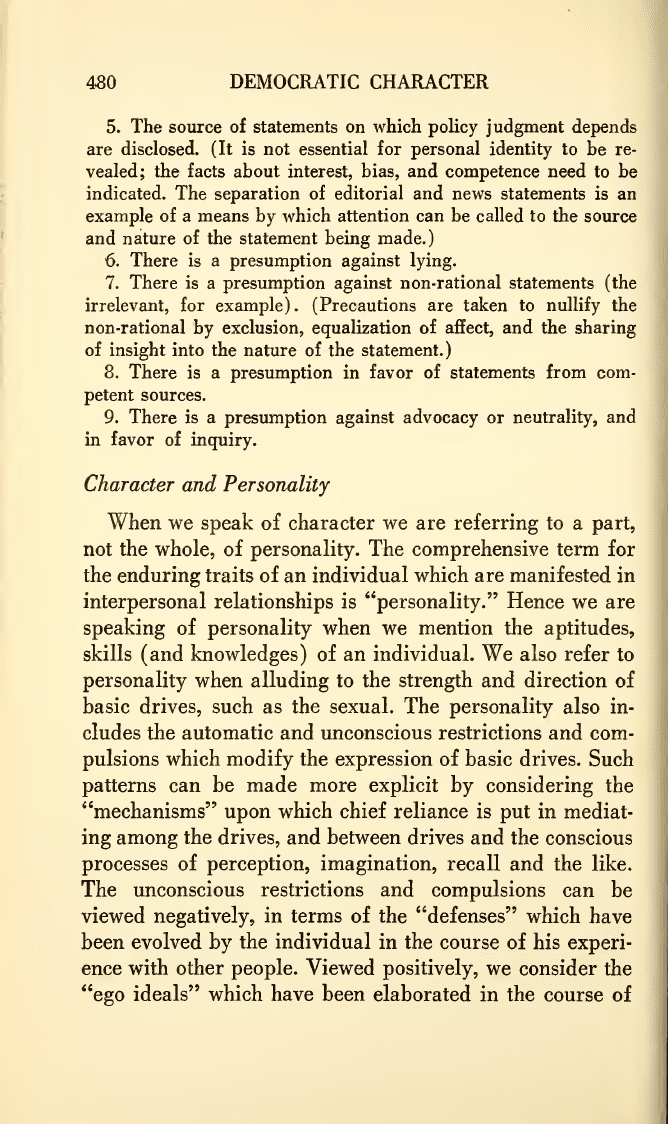
4S0
DEMOCRATIC CHARACTER
5. The source
of statements on which policy judgment
depends
are
disclosed. (It is not essential for personal identity to
be
re-
vealed; the facts about interest, bias, and competence need
to be
indicated. The separation
of editorial
and
news
statements
is an
example of a means by which
attention can
be
called
to the source
and nature
of
the statement being made.)
6. There is a presumption against lying.
7.
There is
a
presumption against non-rational statements (the
irrelevant, for example). (Precautions are taken to nullify
the
non-rational
by
exclusion, equalization of affect,
and
the
sharing
of insight into the nature of the statement.)
8. There
is a presimaption in
favor of statements
from com-
petent
sources.
9. There is a presumption against advocacy or
neutrality, and
in
favor
of inquiry.
Character
and Personality
When we
speak of
character we
are
referring
to a part,
not the whole, of personality. The comprehensive term for
the enduring traits of an individual which are manifested
in
interpersonal relationships is "personality." Hence we are
speaking of personality when we mention the aptitudes,
skills
(and
knowledges)
of an
individual.
We
also
refer
to
personality
when
alluding
to
the strength
and direction
of
basic drives,
such as
the sexual. The personality
also in-
cludes
the automatic and unconscious restrictions
and com-
pulsions which modify the expression of basic drives.
Such
patterns can be made
more explicit
by considering
the
"mechanisms" upon which chief reliance
is put in mediat-
ing among the drives, and between drives
and the conscious
processes of perception,
imagination,
recall and
the like.
The
unconscious restrictions and
compulsions
can be
viewed
negatively,
in
terms of the "defenses"
which
have
been evolved by
the individual
in the course
of his experi-
ence
with other people. Viewed positively,
we consider
the
"ego
ideals" which have been elaborated
in
the
course
of
